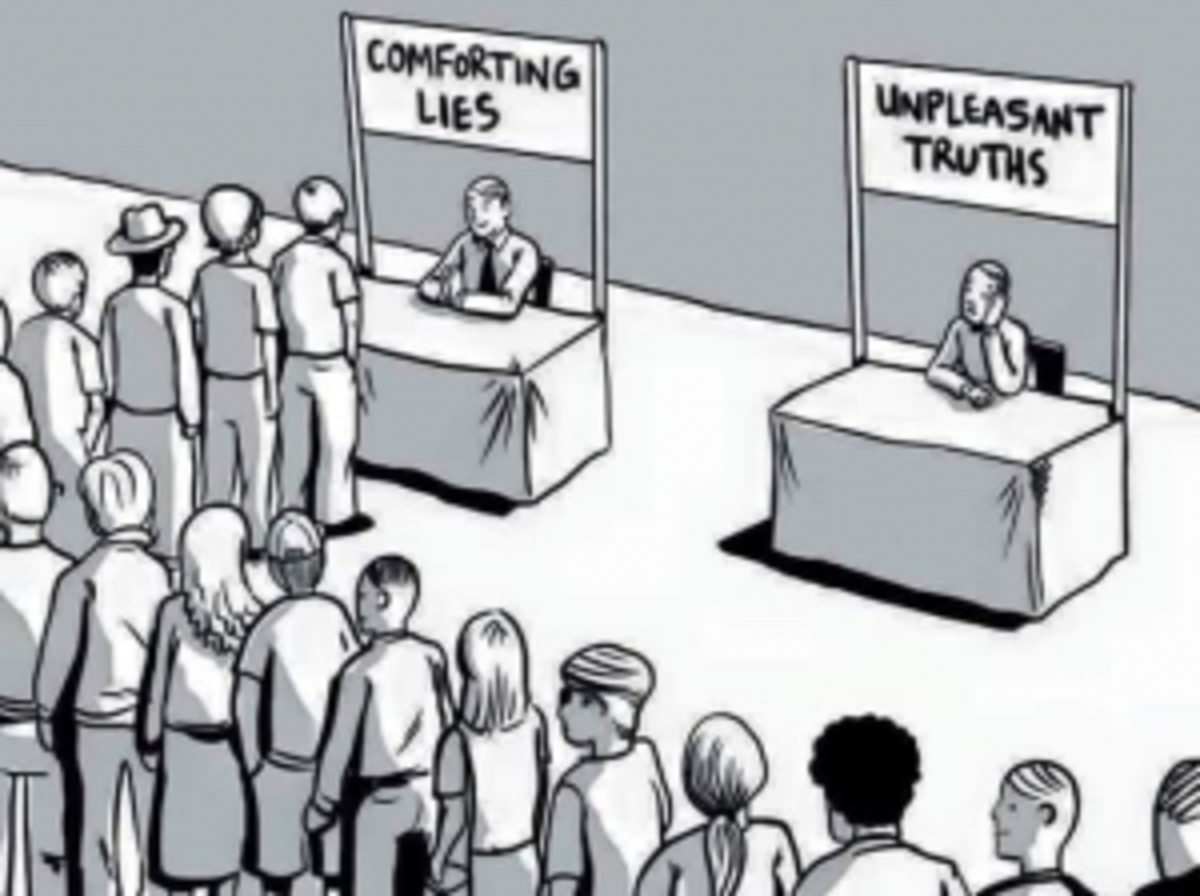Self Delusion and Deception: Maybe We're Not so Smart

David McRaney is a journalist with a passion for psychology and interests in blogging and twittering. He started a blog in which he began to explore some self delusions; ways we all deceive ourselves through faulty thinking and reasoning. He used narrative journalism to explore these delusions and over time gathered a following of fans and a good collection of mental distortions and biases. He wrote about three categories of distortions known as cognitive bias, fallacies and heuristics. These distortions lead to beliefs, feelings and actions that are often not in our best interest and can keep us from taking more effective action or drawing more accurate conclusions.
Cognitive Bias
Cognitive bias is a pattern of poor judgment or a lapse in good judgment that is often triggered by a situation. For example, a mob or herd mentality may lead us to take an action that we might not ordinarily take because everyone else in the group is taking that action. This is known as the bandwagon effect. Sometimes cognitive bias can be effective in making quick decisions without having to think the decision through every time we face a similar set of circumstances. Often misapplication occurs, though, and a fixed decision is applied to a different set of circumstances and a person is unable to perceive that the circumstances have changed. Sometimes cognitive bias results from faulty human brain structure. Cognitive dissonance, an idea explained in a previous hub about Admitting a Wrong, is one of the theoretical causes of cognitive bias.
Fallacies
Fallacies, as you might recall from a logic course, are incorrect arguments in logic that result in unsound conclusions. An example of a fallacy would be to conclude, based on the knowledge that girls wear dresses that all persons wearing dresses are girls. While it is true that girls wear dresses, it is not necessarily true that all persons wearing dresses are girls. Generalizations are fallacies. A person who struggles with depression and anxiety often learns in treatment to recognize patterns of over generalizing, jumping to hasty conclusions or false conclusions without considering all of the facts. A common fallacy in the political arena and in unhealthy relationships is the ad hominem, which is attacking the arguer instead of the argument.
Heuristics
Heuristics are simple rules to live by or to be used for making decisions. They become hard wired in our brains as a result of evolution. Heuristics can be a rule of thumb, procedural guidelines or methods used to accomplish a goal. Cognitive heuristics happen without awareness when we are trying to solve a complex problem by solving a simpler problem. A person might be observed to be answering a different question than he was asked without being aware that he had made a mental substitution that was easier to answer. A model airplane is a heuristic model of an actual airplane. It is not identical to an airplane, but can be used to better understand airplanes. In corporate environments, professionals are often employed to develop algorithms that can be used to essentially replace the professional’s judgment with a technician who can follow the algorithm at a lower wage or salary – at least until circumstances change or an unanticipated event occurs. In politics, most people don’t exert a lot of effort to fully understand public and political concepts, but look to the media to simplify the concepts so that a person might seem to be more informed than he is. Using simplifying shortcuts, complex military and intelligence activity becomes a “war on terror” and any form of government assistance becomes “socialism.”
Launch Trailer
You are Not so Smart
David McRaney’s blog was the beginning of a recently released book identified by The Atlantic magazine as one of the best psychology books of 2011. His book, You Are Not So Smart, lets us all know in a very fun-loving way that we are not as smart, logical and rational as we like to believe. We are all delusional and deceived, and reality is very often much different from the way we perceive it. We are, as he says in his blog, unaware of how unaware we are.
The launch trailer for his book illustrates the concepts in Chapter 5 on the Texas Sharpshooter Fallacy. It identifies the misconception that we “take randomness into account when [we] are determining cause and effect.” He identifies the reality or truth of the matter is that we “tend to ignore random chance when the results seem meaningful or when [we] want a random event to have a meaningful cause.” Chapter 5 walks us from misconception to truth, from delusion to sanity, all for naught possibly as our minds seem set to deceive us.
In the book trailer we learn that we have too many facebook friends if we have more that 150, that most of our memory is fiction, and 46 other ways we deceive ourselves. The book begins with an introduction that shows clearly that we all share a false belief that we are logical, rational and intelligent beings. We learn the truth that we all are deluded – and that’s ok.









